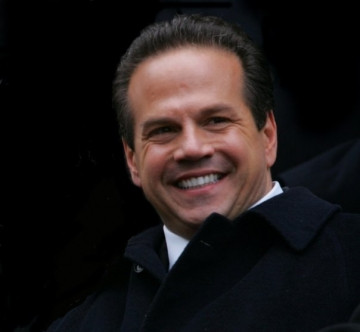Cicilline Sponsors Bill to Stop Excessive Oil Speculation
Friday, April 20, 2012
With the current gas price spike approaching levels last seen in the summer of 2008, R.I. 1st District U.S. Rep. David Cicilline and two other House Democrats are attempting to resurrect a measure they say will limit fuel market speculation they blame for driving up pump prices.
The Energy Markets Emergency Act, which Cicilline is co-sponsoring with Reps. Maurice Hinchey (D-N.Y.) and Raul Grijalva (D-Ariz.), would set a 14-day deadline for the Commodity Futures Trading Commission (CFTC) to implement rules to stop excessive speculation by Wall Street traders in oil futures markets. U.S. Sen. Bernie Sanders (I-Vt.) is sponsoring a companion version in his chamber.
In an interview with GoLocalProv this afternoon, Cicilline, from Washington, D.C., said the recent spike in gas prices, about 50 cents per gallon higher in Rhode Island than in January, to nearly $4 per gallon has been driven by a high ratio of speculative buying to purchases for actual delivery.
“It’s become a real problem for Rhode Islanders, whether they’re out of work or just trying to get to work. We can’t control the world’s oil market or production, but we can put the brakes on Wall Street speculation,” he said.
A similar measure, with bipartisan sponsorship, to address a price surge topping $4 per gallon passed in June 2008 by a 402-19 House vote. Republican opposition in the Senate, however, killed the bill, as a 50-43 majority on a cloture vote fell 10 votes short of the 60 needed for a full floor debate and vote.
The circumstances are different this time, Cicilline said, citing increased oil supplies and domestic production from four years ago.
“Our supply is higher than it was three years ago, when gas was $1.94 per gallon, and demand in the U.S. is the lowest it’s been in 15 years,” he said.
GET THE LATEST BREAKING NEWS HERE -- SIGN UP FOR GOLOCAL FREE DAILY EBLASTThe largest cause of increasing gas prices, he said, has been a fundamental change in the oil market. Cicilline said about 80 percent of the oil purchases are made by speculators, with about 20 percent actual purchases for delivery to users, citing the view of Gary Gensler, CFTC chairman, who testified at a November Congressional hearing that the speculation ratio had more than double over the past decade.
“It’s turned the market into a casino,” Cicilline said.
The measures the CTFC can take, he said, include enforcing position limits on speculative buyers restricting how much purchase activity they can engage in, and setting ratios on what percentage of oil available in a given time period can be purchased by speculators.
The use of the CTFC as an enforcement tool is one of the steps President Obama has mentioned in his response to rising gas prices, but Cicilline said he fears Republican attempts to cut that agency’s budget will hamper the effort to manage the gas crisis.
“One of the president’s steps is to ensure the CTFC, who are the cops on the beat, are funded. To cut funding for it is a step in the wrong direction,” Cicilline said.
"Once again, the American people are being ripped off by Wall Street, and it is long past time for Washington to crack down on greedy speculators who are artificially driving up the price of oil," Hinchey said in a release sent out by the sponsors. "The price of gasoline should be based on the fundamentals of supply and demand. Instead, it is being based on the over-supply of speculators willing to bilk middle-class families. This legislation is desperately needed right now."
“We cannot afford to let the four-dollar-per-gallon status quo continue, and there are easy steps we can take to fix it,” Grijalva said. “Telling taxpayers they can have free gasoline if only oil companies could drill in our national parks is incredibly dishonest. Cracking down on rampant speculation is the easiest, quickest and fairest way to make sure families can afford to get to work and Wall Street doesn’t get rich off everyone else’s difficulties.”
Cicilline is hoping memories of the 2008 crunch and the urgency being felt about current gas prices will earn the bill passage through both houses on its second try.
“There’s been a lot of discussion here about what’s happening with gas prices. Hopefully, as my colleagues go home and hear from their constituents, they’ll realize this is a critical issue,” he said.




